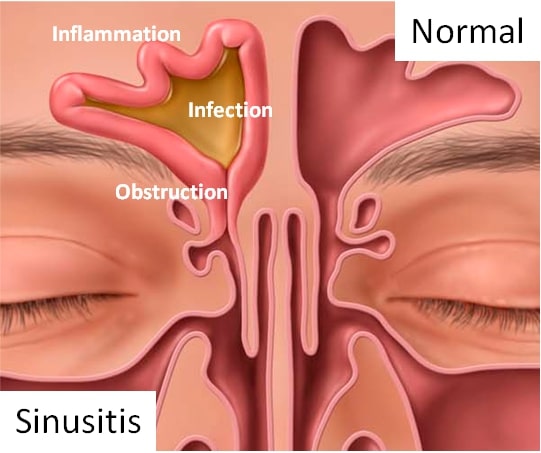What Is Sinusitis?
Sinusitis (sinus infections) affects millions of Americans each year. It is a highly symptomatic condition that has a dramatic impact on quality of life.
How Can I Avoid Sinus Infections?
Sinusitis can stem from various factors, but it always comes down to fluid becoming trapped in the sinuses. This fluid accumulation is perfect for growing germs. If you’re prone to developing sinus infections, there are some steps you can take to prevent the next infection:
- Keep your hands clean.
- Avoid smoking.
- Avoid places where you will come into contact with second-hand smoke.
- Avoid people with colds and respiratory infections.
- Use a humidifier to moisten the air in your home, but keep the filter clear.
- Keep the filters in your air conditioning units clean to prevent mold and dust from collecting.
- Avoid known allergens, if possible.
- Keep your vaccinations up to date.
What Happens If A Sinus Infection Is Left Untreated?
Most sinus infections will resolve on their own, and you can’t be in a rush to throw antibiotics at them. After all, 90 percent of sinus infections are caused by viruses, which don’t respond to antibiotics. The other 10 percent are bacterial.
It’s usually recommended to wait from 7 to 10 days before seeing a doctor. Viral infections will usually burn themselves out in that timeframe. If your symptoms last beyond that period, the infection is likely bacterial. For these cases, antibiotics will help, and they can prevent the infection spreading to the eyes or brain. But those situations are very rare. Most bacterial infections will also run their course if you don’t have other underlying medical conditions.
Formerly, it was thought an untreated acute sinus infection would often turn into chronic sinusitis. That’s not the thinking any longer. Many people now believe that chronic sinusitis is more likely due to underlying issues such as allergies or immune system problems.
Causes Of Sinusitis

Similarly to the inside of your nose, sinuses are lined with a thin layer of tissue called the mucous membrane, which produces mucus. This mucous flows out through the openings of the sinuses into the nose. The mucous from our nose and sinuses is what helps protect us from pollens, pollutants, molds, dust and germs found in the air we breathe. When these openings become blocked, your sinuses may become infected and are often dramatically affected.
Sinusitis Symptoms
Sinusitis is often confused for allergies as symptoms can be similar. Common symptoms of sinus infection include:
- Nasal Discharge (drippy nose or drainage down the back of the throat)
- Congestion
- Facial Pain, Pressure and Fullness
- Headaches
- Sore Upper Teeth
- Bad Breath
- Fatigue
- Low-Grade Fever
Sinuses are four pairs of hollow spaces found in the facial region around the nose and eyes. Sinuses include:
- Frontal
- Maxillary
- Ethmoid
Anything that causes swelling in the nose can block the openings between your sinuses and your nose, including a cold, an allergic reaction such as hay fever, or a reaction to some chemical to which you’ve been exposed. The blockage causes air and mucus to become trapped within the sinuses, which may trigger painful symptoms.
Types Of Sinus Infections
Sinusitis is categorized by the amount of inflammation someone has and the duration of the infection. Sinusitis can occur in any of the four pairs of sinus cavities, all of which are named for their locations.
- Frontal, in the frontal bone of the forehead
- Sphenoid, in the sphenoid bone, at the center of the pituitary gland
- Ethmoid, between the nose and eyes
- Maxillary, under the eyes, behind the cheeks
What Is The Difference Between Acute Sinusitis, Subacute Sinusitis, And Chronic Sinusitis?
Sinusitis is classified by duration:
- Acute sinusitis — Lasts up to 4 weeks. This is the most common form.
- Subacute sinusitis — Symptoms endure longer than normal acute timeframes, lasting between 4 and 12 weeks.
- Chronic sinusitis — Symptoms persist, or continually return, after 12 weeks. Chronic sinusitis will likely require more invasive treatment approaches.
Causes Of Chronic Sinusitis
These are the common causes of chronic sinusitis:
- Nasal polyps — When polyps grow in the nasal passages or the sinuses this can mucus drainage.
- Deviated nasal septum — If a person has a crooked septum (the wall between the nostrils), this can block or restrict the sinus passages.
- Respiratory tract infections — Respiratory tract infections, usually from the cold virus, can inflame and thicken the sinus membranes and block mucus drainage.
- Allergies — When the body overreacts to allergens, the sinuses become inflamed and swollen.
- Other medical conditions — Various immune system-related diseases can cause blockage of the nasal passages.
Causes Of Acute Sinusitis
In most cases, acute sinusitis, which lasts 4 weeks or less, is caused by the common cold, a viral infection. It can also be due to allergies. For instance, a person allergic to ragweed has a good chance of developing a sinus infection during times when ragweed is out.
Read what our patients are saying!
"I recently had my first appointment with Dr. Gould.The office seems to be state of the art!. The staff couldn't have been more pleasant. When I met Dr. Gould, I could see he takes pride in his work and is very caring. I look forward to my nest visit."
How Is Sinusitis Diagnosed?
In order to facilitate successful treatments, an accurate diagnosis is needed first. Too often, treatments are initiated without really knowing the cause of the patient’s symptoms. Treating the symptoms alone may alleviate them temporarily, but the symptoms will often return, over and over again.

A successful diagnosis may include:
- A careful review of each patient’s medical history and symptoms
- A Nasal Endoscopy
- A low-dose MiniCAT Instant CT Scan
- An Allergy Test
The sooner an accurate diagnosis is made, the sooner we can initiate a treatment plan tailored for you. This allows us to correctly treat your problems right away and it can save you the time and expense of going to multiple places to have tests performed and taking medications that may not help.
Sinusitis Treatment
Today, many medications for the treatment of sinusitis are readily available over-the-counter while others are by prescription only. These medications are often taken in combination in an effort to achieve relief. These medications include:
- Saline/Salt Water Irrigation
- Pain Relievers (such as Tylenol or Motrin)
- Mucus Thinning Agents (such as Guaifenesin)
- Decongestants (either nasal spray or pill form)
- Antihistamines (either nasal spray or pill form)
- Antibiotics
- Steroids (either nasal spray or pill form)
Simple, Proven Sinus Procedure
If you have tried many of the above listed medications, yet continue with routine sinus infections, s it is time to see if Balloon Sinus Dilation is right for you. Balloon Sinus Dilation is design to reverse the sinus infection cycle by widening blocked sinus passages. It’s a simple, proven, in-office procedure and is covered by most insurance plans!
Sinusitis Relief Testimonial
We help patients get rid of Sinusitis pain by offering Ballon Sinusitis Dilation to open blocked sinus passages.
Schedule A Consultation
To learn more about Sinusitis in St. Louis, please call 314-582-0888 to schedule a consultation with our experienced team at our office's in St. Louis and Festus, MO. You can change your life with nose surgery and you can take the first step by speaking with us.

